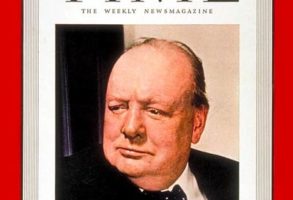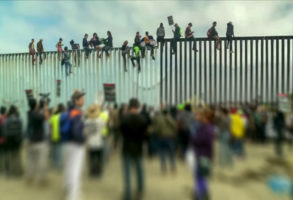
Published December 24, 2020
Scrooge will still send the goose around to the Cratchits, but the boy who delivers it will be wearing a mask. I imagine the nephew has called off his party, so that Uncle Ebenezer will not perform his usual Dickensian frolic (the geezer’s dance of grace and redemption). Instead, he will make the best of a bad time, sitting alone in the cold house and waving at his relatives through the Zoom lens.
Christmas is not its old self. None of us is. The holiday is fraught and compromised—a distracted pause in the country’s uncertain journey through a land of pandemic danger, political turmoil, and economic chaos. December 25 somehow seems less to the point than January 5, the date of the special elections for the Georgia Senate seats that will determine the American balance of power in the next two years (at least); or January 20, when the unpredictable Donald Trump is supposed to vacate the White House (but who knows?) and Joe Biden is scheduled to take possession.
Like Scrooge, we’ll do our best. Christmas should be better than this. If the phrase did not sound a little violent, I’d adapt Kafka’s line about books and say, “Christmas should be an axe for the frozen sea within us.” Christmas should speak of the power of love, of forgiveness—a truce, a tenderness. There’s not much of that right now in the noisy, nasty public square.
Privately, of course, Christmas in any year may be packed with intense emotional meanings—some fairly neurotic. (I know people who are delighted that the pandemic has spared them their usual ordeal). This abnormal Christmas of 2020 is so complicated and novel in its stresses that it may allow us to see the country from an unusual angle.
As I write this, it is Christmas Eve morning. The year 2020, more than most, calls for a sermon. I ascend the pulpit.
On Christmas, we wish to speak of innocence and the manger. But lo—politics, saturated this year with an unusual measure of stupidity and incompetence and ill will, corrupts the atmosphere. Christmas, in its religious essence, is a profoundly meaningful occasion—and it happens that at this moment, America is in the grip of unprecedented meaninglessness. Or rather, it is suspended—dangling, frantic—between meanings. It needs to be reminded of the First Law of Wing-Walking: Never let go of what you’ve got until you’ve got hold of something else. It’s a good idea to make sure the new something is preferable to the old something.
For a generation or two or even three, forces of culture and ideology, in a titanic though sometimes subliminal struggle, have managed to drain the meaning out of America. Sanity, it seems, has gone with it. I exaggerate—but not much—to make the point. In a culture of screens, the flash-mob sanctifies every experimental impulse, every idiot whim, as a New Truth. Vanished are the premises of the former normality: the remnants of the origin myths, what Lincoln called the “mystic chords of memory.” (When he used the phrase in his First Inaugural, he was trying to avert a civil war; it didn’t work). The American backstory (heroes, equestrian statues) has been chipped away, and so have such stabilizing contexts as domesticity, the quaint masculinity of the American male, the (well, you know, atavistic, sexist) meanings of men and women in the Dagwood and Blondie roles. Those all have been scorned out of favor as having been the old lies of a wicked country, which, in reality, was a sort of tsarist regime of “white supremacy.” Good riddance to it. (Really?)
The former America and its meanings have been so damned and assaulted and canceled that they seem almost to have passed out of existence, at least in the minds of elites (media, universities, sleek corporate tech), where a new universe of values—a realm self-confidently totalitarian, incapable of self-criticism, and not nearly as wonderful as it thinks it is—has coalesced. The last samurai, defending the old dispensation, do battle, faute de mieux, under the flag of Trump. That’s a shame, because Trump and his ways give a wrong impression of the samurai and what they defend.
What does the country stand for? What does America believe? What is it? A hero? A monster of injustice? Or just an incompetent slob?
Americans have always been a self-conscious people—if such a various bunch may call themselves “a people”—and have needed to think of themselves as virtuous and significant and preeminent: exceptional. The current crisis leaves them feeling meaningless. It’s not much of a City on a Hill if its citizens are out rioting and the food lines go around the block.
America is in exile from itself. People flee to identity politics in search of the lost idea. They flock to “diversity”—a mischievous mirage. They seek to create new meanings in cunning inversions of reality, as if to create a counter-universe. Is that the way forward? The universities become laboratories and models and alchemists of the alternate meanings.
When Jesus grew to manhood, he set about addressing the problem of human meaninglessness. His answer was love, which, at the time, was a revolution. At 33, he was crucified. Jerusalem was full of fake news that day. Pilate asked, “What is truth?” He foisted upon the world the terrible suggestion that no such thing as truth exists.
Truth does exist, but it must be approached with humility, with the chaste excellence of Cordelia—a quality entirely lost in our time, which belongs to Goneril and Regan. In the year 2020, the truth seems to have gone into hiding, out of disgust and embarrassment and confusion.
I’ll step down. For all of that—with all our sins and imperfections and miseries— let’s light the lights and embrace the day and think about its old meanings. Merry Christmas.




